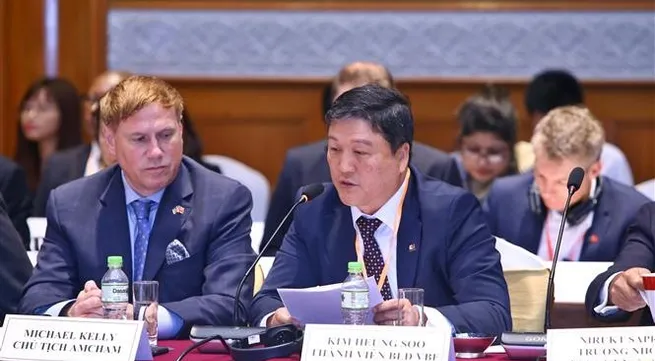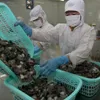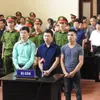VBF 2018 pushes up FDI-domestic businesses links
by ,http://vietnamnews.vn/economy/451350/vbf-2018-pushes-up-fdi-domestic-businesses-links.html04 July 2018 Last updated at 22:03 PM


HÀ NỘI — This year’s midterm Viet Nam Business Forum (VBF) between the Government and the business community opened in Hà Nội on Wednesday.
Speaking at the opening ceremony, Minister of Planning and Investment Nguyễn Chí Dũng said 2018 marked the 30th anniversary of the first foreign investment in Việt Nam.
The political system, Government agencies from the central to grassroots levels and the business community had been trying to improve the business environment, including through 21 years of co-operation through the VBF, he said.
Legal documents were issued and policies updated over the years to help businesses overcome difficulties, create an open investment environment and attract more investment, he said.
He noted that the domestic and foreign business communities in Việt Nam had grown together with the country.
They had been an important driving force behind the country’s economic growth, he said.
Dũng said the country’s GDP reached US$220 billion last year, eight times 1997’s figure, and was expected to reach $300 billion in 2020.
The contribution of foreign direct investment to these achievements could not be denied, he said. According to the ministry there are 128 countries and territories with investments of more than $326 billion in Việt Nam. The foreign direct investment (FDI) sector contributes about 25 per cent of society’s investment capital, accounts for 20 per cent of GDP, 50 per cent of industrial production and 72.6 per cent of exports, creating 36 million direct jobs and 5-6 million indirect ones.
"Technological innovation, social concern and globalisation are driving forces behind the development of enterprises in the Industry 4.0 era. It is also the basis for changes in the thinking of the Government to create a smooth business environment," he added.
"The development of supporting industries and technology transfers are modest", said Dũng.
Speaking at the forum, Chairman of the Korean Chamber of Commerce in Việt Nam Kim Heung Soo said many domestic enterprises could not produce auxiliary products for FDI enterprises. Therefore, the Government and FDI businesses needed to improve this situation.
South Korean businesses were working to develop supporting industries and nurture small- and medium-sized enterprises in the manufacturing sector in Việt Nam, said Kim.
Samsung Electronics Vietnam (SEV), for example, had announced its achievement of 85 per cent productivity improvement through a consultancy programme for Samsung’s Vietnamese vendors. The programme benefited 26 Vietnamese enterprises, who partnered with Samsung, from 2015 to 2017, helping them increase operation efficiency by more than 30 per cent and cut the error rate by more than 20 per cent.
Koji Ito, Chairman of Japan Chamber of Commerce and Industry (JCCI), said strengthening the relationship between FDI enterprises and Vietnamese enterprises was very important for Viet Nam to take on a leading role in the global supply chain.
According to the JCCI, one of the responsibilities of the Government is to issue regulations creating favourable conditions for enterprises to operate in the most open business environment but still maintain discipline.
Specifically, it’s needed to help the two sides increase access to human resources, products and capital in the country.
At the forum, of the many concerns of investors from Japan, Việt Nam’s public debt was a focus of participants.
Koji Ito emphasised that if the Government regulated fiscal policy too tightly, specifically limiting the size of public debt to less than 65 per cent of GDP, it would hinder infrastructure investment. Meanwhile, Việt Nam was in dire need of these investments to ensure economic growth in the medium to long term.
Poor infrastructure would reduce the attractiveness of Việt Nam’s investment to foreign investors. Moreover, it would also lose the opportunity to connect Vietnamese enterprises with FDI enterprises, said Ito.
Based on this, the JCCI expressed its wish that the Vietnamese Government soon take measures to tackle the root causes of the problem to strengthen structural reforms in both revenue and expenditure. At the same time, it was necessary to review the effectiveness of using public debt.
The JCCI expected Việt Nam to tap the necessary capital to build infrastructure to strengthen the link between domestic and foreign enterprises, he said.
Tax and customs policies were also problems for foreign investors at the forum. They expected further improvements from the Government and relevant ministries.
Investors and representatives from Asia, European Chamber of Commerce (EuroCham), American Chamber of Commerce (AmCham) and the British Business Group said that despite efforts made by Việt Nam, there were still many shortcomings in taxation and customs such as problems in exemption and reimbursement of customs duties on export products manufactured by outsourcing, the transparency of tax reports or the professionalism of tax and customs administrators in auditing and inspection, and the barriers that come from post-clearance inspections and tax policies.
Nicolas Audier, chairman of the EuroCham, said tax policy was a matter that needed improvement to attract more foreign investment.
For example, the reform of the special consumption tax calculation to the automobile industry could help dealers. The review of regulations and the imposition of higher special consumption tax on products such as import wines would increase the risk of illegal consumption, while also failing to control violations and harming consumers’ health.
EU businesses paid much attention to the energy market and expected to invest in green energy and technology projects such as wind and solar power in Việt Nam. They hoped the Government would ensure transparency and consistency in investment attraction policies and adopt measures to protect foreign investors and intellectual property rights.
As a consultant, Ousmane Dione, Country Director of World Bank in Việt Nam, said that in order to strengthen linkages between domestic producers and FDI enterprises, domestic producers should increase capacity and competitiveness to become part suppliers for foreign investors.
This was also a step to take advantage of Industry 4.0, said Dione.
Vũ Tiến Lộc, chairman of the Vietnam Chamber of Commerce and Industry (VCCI) and co-chair of the VBF Consortium’s Management Board, said Việt Nam had taken steps towards trade liberalisation and opening the economy through signing the Comprehensive and Progressive Trans-Pacific Partnership, completing the legal review of the Việt Nam-EU Free Trade Agreement and implementing the WTO Agreement on Trade Facilitation.
Together with the 10 other FTAs Việt Nam had signed, it was important that Việt Nam gets access to a wide range of markets around the world and improve its economic institutions, he said.
"The effect of reform and the efforts to open the door has brought new credibility to the business community and a new face to the investment environment in Việt Nam,” Lộc said.
The forum, titled ‘Linkages between Domestic and FDI Businesses towards Common Goals’ was organised by the Ministry of Planning and Investment, the World Bank, the International Finance Corporation and the VBF.
The event included main sessions on building value chains, addressing technological challenges and developing financial resources for sustainable growth.The forum serves as a dialogue between the Government and businesses for improving business conditions, which is necessary to foster the development of private enterprises, facilitate the investment environment and contribute to sustainable growth. — VNS





